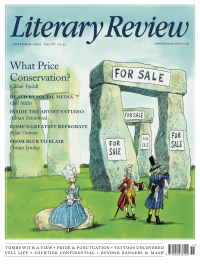Costica Bradatan
Onward Christian Emperors
Christendom: The Triumph of a Religion
By Peter Heather
Allen Lane 736pp £35
Has it ever occurred to you that the last millennium and a half of Western civilisation could have easily been pagan? Or Manichaean? Or Muslim? Or that, even if it were Christian, it could have involved a very different form of Christianity – Gnostic or Cathar, for example? We tend to see history as a benevolent guide in whose hands we place ourselves with trust and without much thinking. We take it, in a tip of the hat to Cicero, to be magistra vitae (‘life’s teacher’). Yet, on closer inspection, history can be a perversely misleading guide and a doubtful teacher. That which has happened prevents us from seeing, or indeed imagining, what could have happened had some circumstances been only slightly different. This is history’s blinding effect: the actual not only supersedes the potential; for the most part it wipes it out of our mind. Were we to pay closer attention to what could have happened, we might realise that history is not the outcome of some mysterious design, the unfolding of God’s plan on earth, but simply what happened to take place, nothing more, nothing less. Like so much in this world, history is the child of chance. This makes it hard to study, difficult to grasp and systematise, but all the more fascinating.
In Christendom, Peter Heather shows how that worked in the case of Christianity. His focus is the crucial thousand years between, roughly, Constantine’s conversion to Christianity and the ecclesiastical reforms brought forth by the first four Lateran councils. That Christianity eventually became so successful and in the process changed so decisively the Western world, Heather observes, has blinded generations of scholars into believing that this part of the world was somehow meant to become Christian. The West’s dramatic de-Christianisation over the last century, however, has poked some serious holes into these predestinarian assumptions. The experience of radical secularisation, according to Heather, casts a new, sobering light on the history of Western Christianity. It’s in that light that he has written Christendom. In this respect, as in others, the book is a brilliant exercise in disenchantment.
‘As late as 300, at the time of Constantine’s conversion,’ writes Heather, Christianity had ‘no central authority structure at all’. It was made up of ‘a series of mostly urban congregations, who elected their own leaders and … for the most part ran their own affairs independently’. The

Sign Up to our newsletter
Receive free articles, highlights from the archive, news, details of prizes, and much more.@Lit_Review
Follow Literary Review on Twitter
Twitter Feed
'A charming and amusing personal history'
Don't miss this brilliant @Lit_Review review of #WorldCupFever 👇
@KuperSimon's must-read footballing journey in nine tournaments is out now ⚽️🏆
Michael Taylor - The Beautiful Game
Michael Taylor: The Beautiful Game - World Cup Fever: A Footballing Journey in Nine Tournaments by Simon Kuper; Th...
literaryreview.co.uk
In the summer of 1918, the Caspian port of Baku played host to a remarkable group of Allied soldiers, sent to defend oil wells against the Ottomans.
Anna Reid recounts their escapades.
Anna Reid - Mission Impossible
Anna Reid: Mission Impossible - Mavericks: Empire, Oil, Revolution and the Forgotten Battle of World War One by Nick Higham
literaryreview.co.uk
Alfred, Lord Tennyson is practically a byword for old-fashioned Victorian grandeur, rarely pictured without a cravat and a serious beard.
Seamus Perry tries to picture him as a younger man.
Seamus Perry - Before the Beard
Seamus Perry: Before the Beard - The Boundless Deep: Young Tennyson, Science, and the Crisis of Belief by Richard Holmes
literaryreview.co.uk